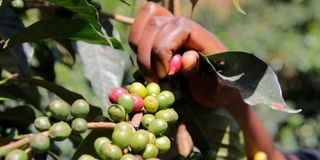Coffee farmers to earn Sh80 per kilogram, says Chelugui

A farmer tends to her coffee in Nyeri town on October 25, 2022.
What you need to know:
- Chelugui said the government's move follows the expansion of the Coffee Chery Advance Revolving Fund from Sh2 billion to Sh6 billion.
- Chelugui revealed that an aggressive coffee reform campaign spearheaded by Deputy President Rigathi had sparked a backlash.
The government has announced a minimum wage for coffee farmers in a landmark move aimed at reviving coffee production in the country.
Simon Chelugui, the Cabinet Secretary for Cooperatives and Micro, Small and Medium Enterprises, said coffee farmers across the country will now earn at least Sh80 per kilo of coffee berries.
“Initially, coffee farmers earned Sh20 per kilo in cherry advance. Through the new Coffee Cherry Fund, President William Ruto has made a new announcement as he delivers on his campaign pledge of a guaranteed minimum return for coffee," Chelugui said.
"There will be a minimum price that will take care of the cost of production and the welfare of the farmer. Through this intervention, the price of cherry advance is now Sh80 per kilo of cherry,” he added.
“Farmers will get Sh40 per kilo of coffee berries after delivering the produce to the factory. Once the coffee is delivered to a miller the farmer gets an additional Sh40. That is not a loan. It is an advance. The market in Nairobi may fluctuate.
"As the government, we are taking the risk to assure the Kenyan coffee farmer that at any one time the price of coffee will not drop below Sh80 per kilo. When the market offers a price higher than Sh80 per kilo of coffee berries, the farmer will receive the excess as a bonus,” the CS said.
Chelugui said the government's move follows the expansion of the Coffee Chery Advance Revolving Fund from Sh2 billion to Sh6 billion in the latest supplementary budget.
“Our stock exchange is not operating at an optimum level. We needed to give it a boost, and we came up with a cabinet memo after listening to the farmers. Considering all factors, and looking at what other global coffee markets are doing, I persuaded the government. Our president has accepted. We have factored in a budget for the Coffee Cherry Fund to support Kenyan coffee farmers," Chelugui said.
"In the last supplementary budget, the government of President William Ruto allocated an additional Sh4 billion to the Coffee Cherry Advance Revolving Fund. This was added to the Sh2 billion [that was already] in the Coffee Cherry Fund.
"This money will set the right price for coffee. We are still going to auction to sell our coffee. But how do we trigger and make an intervention in the market? We must participate actively in the market. We are using the Sh6 billion Coffee Cherry Fund to participate actively in the market,” he said.
Chelugui was speaking in Kangundo and Kikima townships in Machakos and Makueni counties, respectively, on Tuesday when he launched a countrywide sensitisation drive on the Coffee Chery Advance Revolving Fund targeting 37 coffee-producing counties.
The Cabinet Secretary, who was accompanied by Cooperatives and Micro, Small and Medium Enterprises Principal Secretary Patrick Kiburi and new KPCU Chief Executive Officer Timothy Mirugi, was hosted by Makueni Governor Mutula Kilonzo Junior and his Machakos counterpart Wavinya Ndeti.
Kiburi revealed that the country earned Sh30 billion from coffee last year. The PS called for an increase in coffee production through proper management of the remaining coffee bushes.
“A coffee bush here produces at most 2 kilos of berries. Yet there are other places where a bush produces up to 50 kilos of berries. Let us strive to grow the production up to 10 kilos per bush. This will grow our earnings significantly,” he said as Mirugi urged farmers to take advantage of the strong US dollar to produce coffee.
The new coffee production campaign came at a time when coffee production in the country was at a record low, the result of decades of neglect of the industry.
“The average coffee farmer is 60 years old. Unless the government is deliberate in revamping the coffee sector, the industry will collapse because young farmers will be reluctant to embrace coffee farming due to poor pay, exploitative middlemen and the high cost of farm inputs,” said Governor Kilonzo, who is an aspiring coffee farmer in Kikima.
Kilonzo's administration has partnered with New KPCU to distribute hybrid seedlings to coffee farmers.
It has also trained farmers on a range of climate-smart technologies for planting coffee and managing coffee bushes, while Ndeti’s administration has spent millions of shillings on farm inputs and coffee production equipment to boost coffee production, which is the main cash crop in Kangundo, Kathiani, Matungulu and Machakos regions.
Chelugui revealed that an aggressive coffee reform campaign spearheaded by Deputy President Rigathi had sparked a backlash.
“A fight is guaranteed once you remove meat from the mouth of a dog. That is the fight we are waging. They have tried boycotting our coffee but we are confident they will eventually return since they cannot get high-quality coffee anywhere else in the world,” he said, exuding confidence that the future of the industry is bright.
“My dream is for the Kenyan coffee farmer to eventually earn Sh150 per kilo. We are not there yet, but once we tighten our belts we shall get to our destination,” he said.
Chelugui said the government is banking on reforms in the coffee sector contained in a proposed Coffee Bill currently before Parliament to streamline the marketing of coffee. The Bill proposes, among other measures, the establishment of the Coffee Board of Kenya and an expansion of the role played by the Capital Markets Authority in marketing coffee.
He said the regulations, which followed consultations with farmers across the country and other stakeholders in the coffee industry, will herald an end to the woes that have plagued the coffee industry.
The governors renewed the commitment of their administrations to revive the production of coffee.




